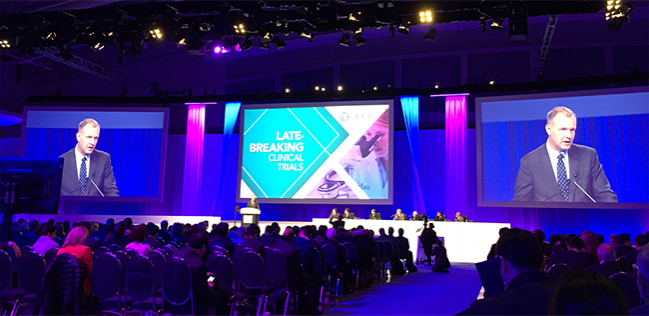CARAT: Novel HDL Mimetic Fails to Show Benefit in Coronary Atherosclerosis After ACS
Controversy remains as to whether further research on HDL-modifying therapies should continue.

WASHINGTON, DC—A novel treatment for coronary atherosclerosis consisting of serial infusions of an HDL cholesterol mimetic now joins a long list of HDL-modifying therapies to show no benefit, this time in patients following an ACS.
By contrast, several presentations here at the American College of Cardiology (ACC) 2017 Scientific Session have “again reinforced the importance of the LDL hypothesis” showing the benefits of lowering LDL cholesterol, said study presenter Stephen Nicholls, MBBS, PhD (University of Adelaide, Australia). Yet, he added, “the HDL field continues to be an unfulfilled promise.”
For CARAT, Nicholls and colleagues randomized 301 ACS patients to receive a series of 10 infusions of CER-001—a synthetic negatively-charged HDL cholesterol containing Apolipoprotein A-I (ApoA-I) and sphingomyelin—at a dose of 3 mg/kg or placebo. They used IVUS to measure the primary endpoint of median change in percent atheroma volume.
There were no differences observed between the study drug and placebo in the overall primary endpoint (-0.09% vs -0.41%; P = 0.15) or when looking specifically at the entire vessel length (P = 0.64) or the most diseased 10-mm segment (P = 0.51). Further, there were no advantages observed for the study drug among any prespecified subgroups, but there were apparent benefits for placebo in patients with greater plaque burden and in those who had never before been treated with a statin.
“Whether HDL therapy can impact plaque or clinical events in the setting of contemporary therapy remains to be determined, although with each disappointing study result the considerable challenge remains,” Nicholls observed, adding that there remains a possibility that this compound could have an impact in other clinical settings.
‘No HDL Hypothesis’
Discussing the study, panelist Deepak Bhatt, MD, PhD (Brigham and Women’s Hospital, Boston, MA), said “at least at the surface, it looks like another victory for placebo. But that's ok. Nothing wrong with that. That's why we do trials.”
At least at the surface, it looks like another victory for placebo. Deepak Bhatt
Using IVUS in a study to measure plaque in a study like CARAT “shows its value,” he continued. “It doesn't take the place of large randomized clinical trials either for efficacy or safety evaluation, but it does help evaluate early on in the drug's development whether we should proceed to that large cardiovascular outcomes trial.”
Bhatt said he would encourage continued research on both this compound and on HDL-targeted therapies in general. However, he stressed taking a “step back” to refocus, since the HDL field is lacking any evidence to show that raising levels leads to fewer events.
“We do not have an HDL hypothesis,” Nicholls said. “I don't think this should deter others in the field who are developing other agents to try and move forward.”
However, sitting in the audience during the presentation, Paul Weisman, MD (Aurora Healthcare, Milwaukee, WI), disagreed. Studies like CARAT should “absolutely” deter future research in this field, he told TCTMD. “They should stop spending millions of dollars on studies that have drugs that raise HDL cholesterol, because it has never been shown to [improve] clinical outcomes.”
The “reality” is that physicians are still looking for “novel approaches to be able to deal with that modifiable residual risk” in many patients, Nicholls concluded in a press conference. “I certainly don’t limit those.” But every negative trial will sway researchers toward other targets, he acknowledged.
Yael L. Maxwell is Senior Medical Journalist for TCTMD and Section Editor of TCTMD's Fellows Forum. She served as the inaugural…
Read Full BioSources
Nicholls SJ. Effect of serial infusions of CER-001, a pre-beta high-density lipoprotein mimetic on coronary atherosclerosis: results of the CARAT study. Presented at: ACC 2017. March 18, 2017. Washington, DC.
Disclosures
- CARAT was funded by Cerenis Therapeutics.
- Nicholls reports consulting for AstraZeneca, Amgen, Anthera, Boehringer Ingelheim, CSL Behring, Eli Lilly, Esperion, Merck, Takeda, Roche, Kowa, LipoScience, Novartis, and Sanofi-Regeneron and conducting clinical trials for Amgen, Anthera, AstraZeneca, Eli Lilly, Novartis, Cerenis, The Medicines Company, Resverlogix, InfraReDx, Roche, Sanofi-Regeneron, and LipoScience.
- Bhatt reports serving as a member of the advisory boards of Cardax, Elsevier Practice Update Cardiology, Medscape Cardiology, and Regado Biosciences; and receiving research funding from Amarin, Amgen, AstraZeneca, Bristol-Myers Squibb, Eisai, Ethicon, Forest Laboratories, Ischemix, Medtronic, Pfizer, Roche, Sanofi, The Medicines Company (including for his role as co-chair of the 3 CHAMPION trials). He also lists extensive nonpharma/device roles, some unpaid, among his conflicts.


Comments